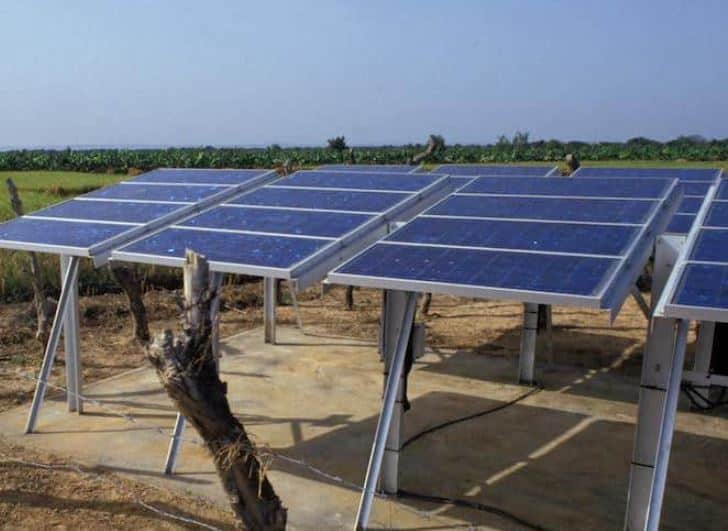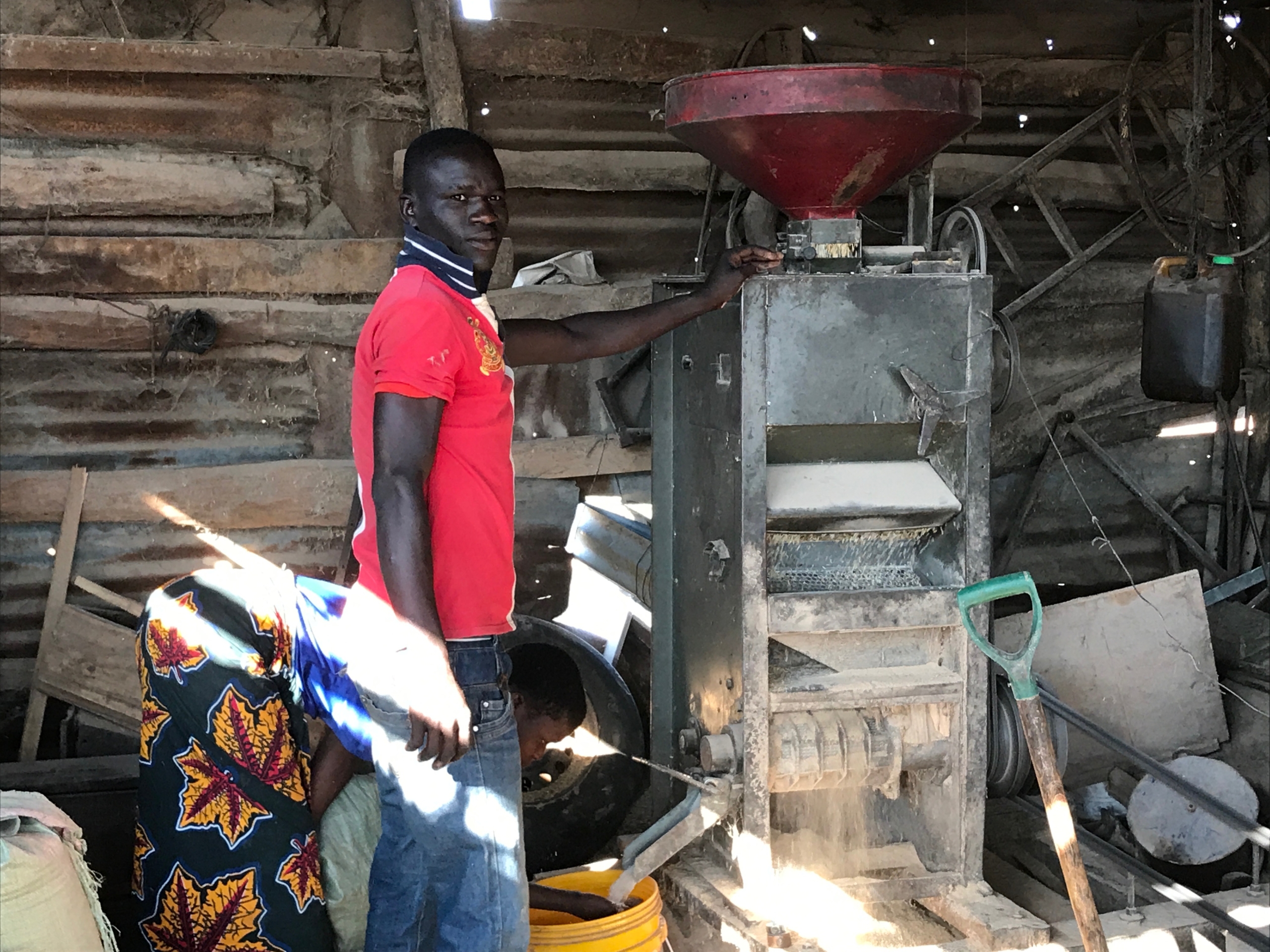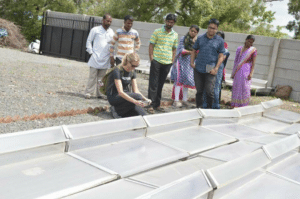Oct 09, 2017
Tags: Energy, Agriculture, Waste, Mobility, Tech Entrepreneurship, Impact Investing,
A Simple Machine Changes Lives of Farmers in Rural Maharashtra!
By: Atreya Pal
“Ten years ago, I could not even believe that I would be an entrepreneur, have my own factory, and help women in my village earn more and have better health,” said Prabhavati. Previously a farm laborer earning a daily wage of 30 rupees a day (50 US cents), Prabhavati is now a ‘factory’ owner. She owns a piece of land where she has installed 40 solar dryers, where women from villages come and get their agricultural produce dried. Since dehydrated vegetables and fruits are preserved, it allows villagers to sell them to a wider and more lucrative market. Moreover, they now have access to nutritious food even during lean seasons. A study conducted by Gates foundation has found that the hemoglobin levels of women in this village has gone up from 8g/dL to 9g/dL, a significant increase, as a result of these dryers being installed!
The Factor[e] team recently visited this particular village, Hatmali, located 20km north-east from the city of Aurangabad in Maharashtra, India. Located amidst picturesque rolling hills, Hatmali is a progressive village; farmlands are irrigated from a nearby tank, and improved agricultural practices allow a wide portfolio of crops to be grown, ranging from fruits, vegetables and herbs, such as pomegranates, ginger, onions, tomatoes, fenugreek and coriander, to grains like bajra. Even though farming conditions are hard, with temperatures often hitting 120 degrees F, a rocky soil and an unpredictable rainfall pattern, because of improved agricultural practices and irrigation, productivity has been very good over the past few years.
Despite producing very good crops, most farmers in Hatmali and neighboring villages are still locked in cycles of poverty and debt; in a successful year the income of a 1 acre farmer ranges from Rs. 60,000 to Rs. 80,000 ($950-$1250). The reasons for this is numerous: Hatmali is located in a remote area, with very poor road connectivity; it is difficult for farmers to travel for 4-5 hours to reach the mandis (traditional market-yards for selling horticultural produce) on a regular basis, as a result they stockpile their produce for a few days before going to the mandis. Stockpiling causes quality reduction in some of their perishables, which reduces fetchable value. Without any way to preserve produce, farmers are exposed to very high inventory risk. Moreover, in harvesting seasons, agricultural markets experience price crashes due to supply gluts, but produce being perishable, must be sold, even at rock bottom prices. Sometimes price crashes are so severe that farmers choose to not pick produce from their fields; they let it rot since it will cost them higher to pick produce from their fields. The main problem recognized was: lack of preservation infrastructure.
Factor[e] at Prabhavati’s Factory
Processing produce in centralized processing plants seems like a good solution, however these facilities procure produce at rock bottom prices and often pay prices even lower than mandis. Moreover, farmers themselves do not participate in the value addition process and hence the benefits for the same do not reach them. Several farmers told us about nearby processing centers, but all agreed that benefits from these processing centers rarely reached them. Sensing this opportunity, a startup from Mumbai, partnered with a NGO, started distributing small and decentralized solar dryers to women, which now allows them to process produce from their own fields and participate in the value addition process themselves.
The dryers are well designed, sturdy and easy to use. Women dry whatever is grown in their fields (ginger, tomatoes, herbs and spices) and this allows them to preserve produce well beyond the harvesting season. This has many benefits. Since the value addition is being performed by women, they get the benefit of the intervention. It also allows farmers to hedge their bets against prices crashes during supply gluts. Dehydration allows significant shelf life increase and allows sale to a much wider market, allowing farmers to take the best prices, and if farmers are unable to find markets themselves, the startup distributing the dryers buy the produce back from the farmers and sell it to B2B channels. Having a supply of dehydrated produce allows farmers to have access to nutritious food during lean seasons when nothing is grown and a project, undertaken with the aid of Gates Foundation and USAID shows the significant increase in hemoglobin levels in women at Hatmali. Moreover, at a higher level, post-harvest losses are also averted, which cost India anywhere between 25-30% of produce.
Designed specifically for a 1 acre farmer and priced very competitively, these dryers involve only about 1-2 hours of labor per day by the woman of the house and fits in very well with her daily routine, and a single dryer is able to bring in an income of around Rs. 10000-Rs 15000/year, which is about 15-20% of the annual income of a 1 acre farming family. We also found out some women like Prabhavati, who have started running centers with multiple dryers, and have become entrepreneurs themselves.
Through our field research, we have found that solar drying technology has demonstrated a positive impact for women in the village of Hatmali. We were encouraged to learn how a technically focused approach to post harvest handling could deliver such high socio-economic impact.

 Catalytic Investing in Emerging Markets
Catalytic Investing in Emerging Markets The Nexus of Agriculture and Energy in Africa: Five Lessons for Bridging the Ag-Energy Gap
The Nexus of Agriculture and Energy in Africa: Five Lessons for Bridging the Ag-Energy Gap Looking Beyond Appliances: Systemic Barriers to Minigrid Demand Stimulation
Looking Beyond Appliances: Systemic Barriers to Minigrid Demand Stimulation The Clock is Ticking on Energy Access: Exploring Factor[e] Ventures’ Big Bet on Mini-Grids
The Clock is Ticking on Energy Access: Exploring Factor[e] Ventures’ Big Bet on Mini-Grids